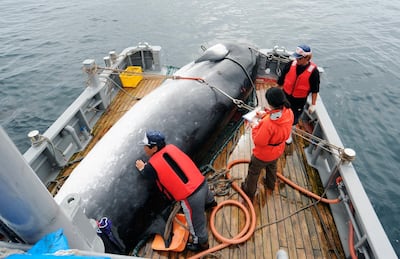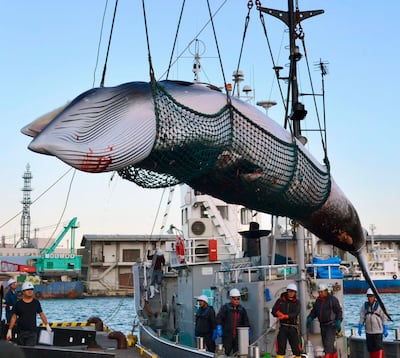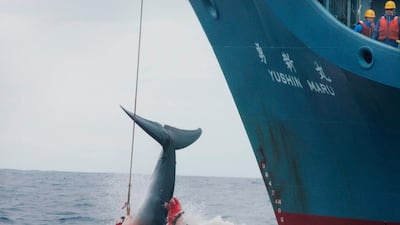Japan announced it is withdrawing from the International Whaling Commission and will resume commercial whaling next July, in a move expected to spark international criticism.
Wednesday's move was widely expected and came after Japan failed in a bid earlier this year to convince the IWC to allow it to resume hunting the animals commercially.
"Commercial whaling... will be limited to Japan's territorial waters and exclusive economic zones. We will not hunt in the Antarctic waters or in the southern hemisphere," top government spokesman Yoshihide Suga said.
Tokyo has repeatedly threatened to leave the body, and has been regularly criticised for catching hundreds of whales a year for "scientific research" despite being a signatory to a moratorium on hunting them.
Mr Suga said Japan would officially inform the IWC of its decision by the end of the year, which will mean the withdrawal comes into effect by June 30.
Leaving the IWC means Japanese whalers will be able to resume the hunting in Japanese coastal waters of minke and other whales protected by the IWC.

But Japan will not be able to continue so-called scientific research hunts in the Antarctic that it has been exceptionally allowed as an IWC member under the Antarctic Treaty.
The withdrawal means Japan joins Iceland and Norway in openly defying the IWC's ban on commercial whale hunting.
Japan has hunted whales for centuries, and the meat was an important source of protein in the immediate post-World War II years when the country was desperately poor.
But consumption declined significantly in recent decades, with much of the population saying they rarely or never eat whale meat.
Whale hunting became a rare thorny subject in Japan's otherwise largely amiable foreign policy, with international opposition only making conservatives dig in deeper in support of the tradition.

Many members of Prime Minister Shinzo Abe's conservative Liberal Democratic Party support whaling, and he himself comes from a constituency where whale hunting remains popular.
Tokyo argues that whaling is an important part of Japan's traditions, and Mr Suga said the withdrawal would allow fishermen to "pass our country's rich whaling culture on to the next generation".
In September, Tokyo sought to convince the IWC to allow it to resume commercial whaling, arguing that stocks of certain species were now sufficient to support renewed hunting.
But the bid failed, with strong opposition from anti-whaling nations – led by Australia, the United States as well as the EU.
Activist groups slammed the decision, with Greenpeace calling it a "sneaky" announcement.
"The declaration today is out of step with the international community, let alone the protection needed to safeguard the future of our oceans and these majestic creatures," said Sam Annesley, executive director at Greenpeace Japan.
__________
Read More:
'Scared' whale shark rescued after getting lost in Dubai Creek
Researchers play tag with gentle giants
__________
The IWC, established in 1946 to conserve and manage the world's whale and cetacean population, introduced a moratorium on commercial whaling in 1986.
Tokyo has long exploited a loophole allowing whales to be killed for "scientific research" and says it is trying to prove the population is large enough to sustain a return to commercial hunting.
It makes no secret of the fact that meat from the expeditions ends up on dinner tables.
"There have been no concessions from countries who only place importance on the protection of whales," Mr Suga said.
"At the IWC general meeting in September this year, it became evident once again that those supporting the sustainable use of whale stocks and those supporting protection cannot coexist, leading us to this conclusion."

